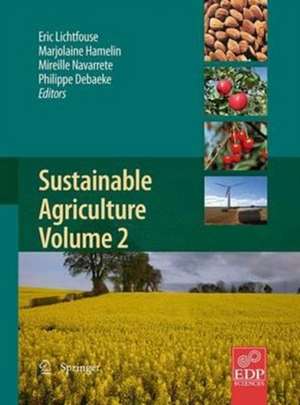Sustainable Agriculture Volume 2
Editat de Eric Lichtfouse, Marjolaine Hamelin, Mireille Navarrete, Philippe Debaekeen Limba Engleză Paperback – 23 aug 2016
Preț: 1778.69 lei
Preț vechi: 2340.39 lei
-24% Nou
Puncte Express: 2668
Preț estimativ în valută:
340.46€ • 369.94$ • 286.17£
340.46€ • 369.94$ • 286.17£
Carte tipărită la comandă
Livrare economică 17-23 aprilie
Preluare comenzi: 021 569.72.76
Specificații
ISBN-13: 9789401778350
ISBN-10: 9401778353
Pagini: 992
Ilustrații: XX, 992 p.
Dimensiuni: 193 x 260 mm
Ediția:Softcover reprint of the original 1st ed. 2011
Editura: SPRINGER NETHERLANDS
Colecția Springer
Locul publicării:Dordrecht, Netherlands
ISBN-10: 9401778353
Pagini: 992
Ilustrații: XX, 992 p.
Dimensiuni: 193 x 260 mm
Ediția:Softcover reprint of the original 1st ed. 2011
Editura: SPRINGER NETHERLANDS
Colecția Springer
Locul publicării:Dordrecht, Netherlands
Cuprins
Section 1 - Novel Concepts.- Section 2 - Food Security.- Section 3 - Sociology and Economics.- Section 4 - Climate Change.- Section 5 - Alternative Pest Control.- Section 6 - Soil Health.- Section 7 - Alternative Fertilisation.
Textul de pe ultima copertă
Sustainability rests on the principle that we must meet the needs of the present without compromising the ability of future generations to meet their own needs. Starving people in poor nations, obesity in rich nations, increasing food prices, on-going climate changes, increasing fuel and transportation costs, flaws of the global market, worldwide pesticide pollution, pest adaptation and resistance, loss of soil fertility and organic carbon, soil erosion, decreasing biodiversity, desertification, and so on. Despite unprecedented advances in sciences allowing to visit planets and disclose subatomic particles, serious terrestrial issues about food show clearly that conventional agriculture is not suited any longer to feed humans and to preserve ecosystems. Sustainable agriculture is an alternative for solving fundamental and applied issues related to food production in an ecological way. While conventional agriculture is driven almost solely by productivity and profit, sustainable agriculture integrates biological, chemical, physical, ecological, economic and social sciences in a comprehensive way to develop new farming practices that are safe and do not degrade our environment. In that respect, sustainable agriculture is not a classical and narrow science. Instead of solving problems using the classical painkiller approach that treats only negative impacts, sustainable agriculture treats problem sources. As most actual society issues are now intertwined, global, and fast-developing, sustainable agriculture will bring solutions to build a safer world.
This book gathers review articles that analyze current agricultural issues and knowledge, then propose alternative solutions. It will therefore help all scientists, decision-makers, professors, farmers and politicians who wish to build a safe agriculture, energy and food system for future generations.
This book gathers review articles that analyze current agricultural issues and knowledge, then propose alternative solutions. It will therefore help all scientists, decision-makers, professors, farmers and politicians who wish to build a safe agriculture, energy and food system for future generations.
This book gathers review articles that analyze current agricultural issues and knowledge, then propose alternative solutions. It will therefore help all scientists, decision-makers, professors, farmers and politicians who wish to build a safe agriculture, energy and food system for future generations.
This book gathers review articles that analyze current agricultural issues and knowledge, then propose alternative solutions. It will therefore help all scientists, decision-makers, professors, farmers and politicians who wish to build a safe agriculture, energy and food system for future generations.
Caracteristici
Presents controversial and new concepts to shift world agriculture from industrial to sustainable Reviews biofuels and C sequestration techniques that offset climate change Discloses the fast emergence of social and economical sciences to develop unprecedented participatory research with farmers Presents alternative soil management techniques to improve food and water security Uses biodiversity instead of chemicals to control pests Includes supplementary material: sn.pub/extras
